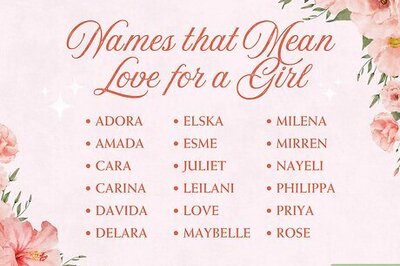
views
"Butterface" Defined
A "butterface" is an offensive term for a woman with an attractive body and an ugly face. This misogynistic slang word is a mashup of the words "but her face," which stems from a sexist joke about women's physical appearances: "Her body is attractive but her face isn't" or "Every part of her is hot but her face." A similar (and gender-neutral) slang term is "face that would stop a clock," while the opposite of a butterface is sometimes called a "butterbody" or a "justerface"/"jesterface" (as in, "just her face is attractive").
"Butterface" Origins & Spread
"Butterface"'s first recorded use was in 1997 as Black college slang. The term originally spread as "buttaface" and gained traction in the 2000s, even inspiring country-rock band Ghettobillies to release an album called Butterface in 2000. The term became Urban Dictionary's "Word of the Day" in 2009, where it received backlash for its sexist roots.
Radio host Howard Stern launched the word into the mainstream in 2015. "Butterface" gained mainstream attention when Stern hosted a satirical beauty contest called "Miss Buttaface" in Las Vegas in 2015. Contestants wore skimpy outfits with paper bags over their heads while male judges commented on their bodies. Yeah, it's as messed up as it sounds.
Is "butterface" offensive?
Yes, "butterface" is extremely offensive, objectifying, and demeaning. The term "butterface" suggests that a woman's worth comes down to her physical appearance—and that other people (typically men) have a right to judge her looks, and in such a casual manner. The term is often used to express disappointment that a woman's body is more attractive than her face, as if it's some sort of moral failing on the part of a woman. It also perpetuates conventional beauty standards, which is super harmful. One person's "butterface" is another person's total dreamboat.
YouTuber Lena the Plug shared how painful it was to be called a "butterface" in a 2017 video. On February 8, 2017, Lena the Plug released a video titled "True Life: I'm A BUTTERFACE (Rant)" in which she describes the frustrating and hurtful experience of being referred to as a "butterface" by certain social media commenters. "I haven't really heard this word attributed to men," she observes, "so I'm gonna go ahead and say that it's a gendered term." The video went on to be viewed more than 400,000 times. She notes she also gets referred to as a "thot," "ho," "wh*re," "sl*t," and "c*m dumpster," adding, "What exactly is a sl*t? What exactly is a wh*re?" highlighting the sexist—and often baseless—nature of such insults.
Can a man be a "butterface"?
"Butterface" typically refers to a woman, but you can use it on a guy. There are no rules. The term "butterface" was created to apply to women, which shouldn't be a shocker, since society is infinitely more laser-focused on women's appearances than men's. ???? Linguistically speaking, since "butterface" is short for "but her face" (and the male equivalent would be "buthisface," which doesn't make as much sense), the term is typically used to refer to women. But this doesn't mean you can't call a man a "butterface." Many people do use the term interchangeably. That's feminism, baby. (We're being sarcastic, in case it wasn't apparent!) In popular culture, the term "butterface" has been used to describe men like Mike "The Situation" Sorrentino of Jersey Shore. And in the 2016 Deadpool movie, canonically hideous Deadpool—played by the decidedly non-butterfaced Ryan Reynolds—says to antagonist Ajax, "Time to undo what you did to this butterface." Zing! "Butterface" has even been used to describe dogs! In a 2017 article called "Is Your Dog a Butterface? This Guy Can Help," Vice magazine interviewed Brazilian veterinarian Edgard M. Brito, one of the world's leading animal plastic surgeons. "An ugly dog is an unloved dog, left forgotten in the backyard, without a ride, dirty and mistreated," he says in the article. "A clean dog, with bright teeth, is loved by his owners." OK! In short, while you can call a man (or a dog) a butterface, you really should avoid referring to anyone this way, regardless of gender (or species)—it's cruel and offensive.
Why Gendered Language Is Problematic
"Butterface" is an offensive term for a woman with no clear male equivalent. "Butterface" is similar to other derogatory slang words like "spinster," "cougar," "Karen," "gold-digger," "s*ut," "mistress," "wh*re," "drama queen," and "b*tch"—all of which were created to refer to women and for which there really aren't masculine equivalents. In fact, some scholars believe there are more derogatory slang words for women than for men. Why is this? These terms are used as tools of control by a patriarchal society. They perpetuate ancient and negative ideas about womanhood and gender roles—often without us even realizing it. Most derogatory slang words used against a woman serve as attacks on her for acting too "masculine"—that is: too domineering or demanding (as in "b*tch," "drama queen," "Karen," or even "bossy," which is an insult applied to women far more than men) too sexual (as in "sl*t," "mistress," "wh*re," "cougar") not sexual/sexually appealing enough (as in "spinster" or "butterface") too greedy (as in "gold-digger") Some of these words, like "drama queen" or "b*tch," are used against men—but it's considered even more belittling in this context because being "feminine" is considered undesirable. Words like "mistress" and "spinster" do have male counterparts—"master" and "bachelor," respectively—but they lose any derogatory implications. (Plus, nobody calls a male affair partner a "master.")
Some sexist language has been reclaimed by women. In some cases throughout history, slurs have been co-opted by the marginalized group they're meant to target and used in an empowering way (but only by members of that group). For instance, the word "sl*t" was co-opted by the founders of Sl*tWalk, a feminist organization that seeks to eradicate rape culture and victim blaming. This rocks (but it doesn't mean you should call anyone any of these words). However, some people feel reclaiming misogynistic slurs (such as "b*tch," which is increasingly used by women in reference to other women, men, and even themselves) can serve to unwittingly reinforce sexism. "Words are our tools of thought," write Sherryl Kleinman, Matthew B. Ezzell, and A. Corey Frost in their paper, "Reclaiming Critical Analysis: The Social Harms of 'B*tch.'" "Any terms that dehumanize others can make it easier for us to harm them." Even when reclaimed slurs are empowering, they should only be used by and to members of the group that has reclaimed them—for instance, unless you're participating in a SlutWalk march, you probably shouldn't just casually throw around the word "sl*t." All this to say…be careful when, how, and if you use any of the derogatory words mentioned in this article. In fact, to be safest, it's probably best to just avoid using any of them at all.




















Comments
0 comment